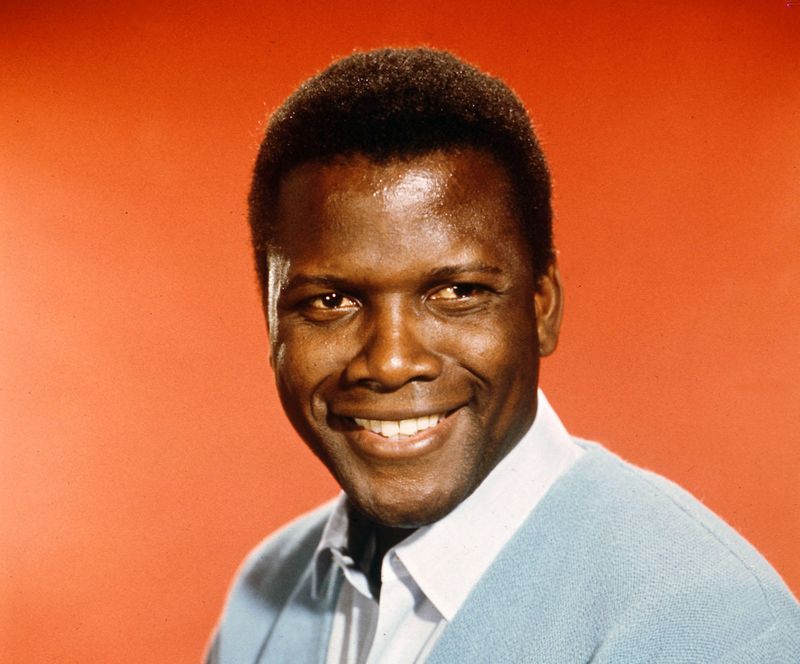(Editor’s note: This story is reprinted with permission. It initially ran on Facebook as a remembrance of Roger and Michelle Potash about Sidney Poitier. Potash is a veteran attorney and he and his wife are Palisades residents.)

Roger Potash posted: THIS MORNING, WE LOST A GREAT ONE!
I pay tribute to the greatest Actor and Human Being…..SIDNEY POITIER…..
In the mid-nineties, Michelle and I were in the bar at Spago, Beverly Hills, waiting to be seated at our table, when out comes Sidney.
Michelle spots him and jumps off of her bar stool, throws her arms around him, plants a kiss on his cheek, and declares “I love you.”
Sidney kisses her back and declares “I love you too.”
A few weeks later, I am in the reception area of Oppenheimer and Co. in Westwood, preparing to have lunch with my Porfolio Manager, when Sidney and his manager join us.
On the elevator, I remind Sidney of that kiss and he asks me for a business card; he takes out a pen and writes on the back….’Michelle, I’ve not forgotten that kiss at Spago…lovingly, Sidney Poitier.”
It is one of Michelle’s most cherished possessions. RIP SIDNEY
OBITUARY—SIDNEY POITIER
Legendary actor Sidney Poitier, 94, died on January 6, in Los Angeles. He was born prematurely, weighing just three pounds. He grew up on Cat Island in the Bahamas, population 1,500, in a home that had no electricity. He quit school when he was 12 to help support his family.
Three years later his father sent him to live with a brother in Miami. Having $3, he traveled steerage on a mail-cargo ship.
He moved to Harlem and took jobs washing dishes, working as a ditch digger, waterfront laborer and delivery man in the garment district.
Before he turned 17, he lied about his age, saying he was 18, so he could join the Army. He was assigned to a mental hospital on Long Island and was so appalled by the treatment of patients, feigned insanity to obtain his release in 1945.
He went to the American Negro Theater to audition, although he had never seen a play and could barely read. With his thick Caribbean accent, the director took him to the door and told him all he could see for him was working as a dishwasher.
“As I walked to the bus, what humiliated me was the suggestion that all he could see in me was a dishwasher. If I submitted to him, I would be aiding him in making that perception a prophetic one,” Poitier later told the AP.
“I got so pissed, I said, ‘I’m going to become an actor — whatever that is. I don’t want to be an actor, but I’ve got to become one to go back there and show him that I could be more than a dishwasher.’ That became my goal.”
Poitier bought a radio and practiced speaking English. He returned to theater and was again rejected but made a deal that he would be the janitor in return for acting lessons.
Poitier got his big break when Harry Belafonte did not show up for a rehearsal attended by a Broadway producer. Poitier, his understudy, took the stage and won a part in the 1946 all-Black production of “Lysistrata.”
“No Way Out” (1950) was his first substantial film role and he played a doctor persecuted by a racist patient. In “Cry, the Beloved Country” (1952), based on the Alan Paton novel about racism in South Africa, he appeared as a young priest.
Next was “Blackboard Jungle” (1955) where he played a troubled student at a tough New York City public school, who eventually sides with Glenn Ford, the teacher who tries to reach him.
“The Defiant Ones” (1958) earned Poitier an Academy Award nomination for best actor, where he played a prisoner on the run, handcuffed to a fellow convict, a racist, played by Tony Curtis.
Poitier won an Academy Award for the 1963 film “Lilies of the Field.”
In 1967 Poitier appeared in three of Hollywood’s top-grossing films: “In the Heat of Night” opposite Rod Steiger, as an indolent, bigoted sheriff, with whom Virgil Tibbs, the Philadelphia detective played by Poitier, must work on a murder investigation in Mississippi.
In “To Sir, With Love” he was a concerned teacher in a tough London high school, and in “Guess Who’s Coming to Dinner,” a taboo-breaking film about an interracial couple, he played a doctor whose race tests the liberal principles of his prospective in-laws, played by Spencer Tracy and Katharine Hepburn.
In 1951 Poitier married Juanita Marie Hardy, a dancer and model, whom he divorced in 1965. They had four daughters, Beverly, Pamela, Sherri and Gina. In 1976 he married Joanna Shimkus, his co-star in “The Lost Man” (1969), a film about a gang of Black militants plotting to rob a factory. They had two daughters, Anika and Sydney.

Regarding parking at US Bank.
I am a US Bank customer as well. After I banked at the branch I walked across street to Starbucks to get a coffee. I came back and there was a ticket on the car by private parking company. 40:00 dollars. I asked the teller and I was told I had 15 minutes after that I can be ticketed. Apparently they are authorized and would report to the city if you don’t pay. She said go talk to the lady. She is there normally between 12-2.
Stellar of a man…..